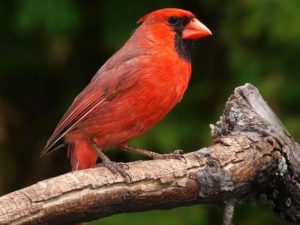Spiritual Reflection: Grief and a season to find connection

When I reflect on community, it is often with a sense of grieving for the connections once found at this time of year. Certainly, traditional communities were communal and intergenerational in their caregiving, with many navigating the harshest stretch of year—the winter season. It is this reality, coupled with headlines of each coast receiving dumps of snow that has occupied my thoughts.
Grief and loss may be taking up space for you. The recent passing of the holidays are well known to amplify these feelings for so many. Perhaps you are mourning the loss of a loved one—someone or several who have been firmly tied to your family, the memories and familiar scenes of seasons remind you of their absence.
The story of the Cardinal who acts as emissary for departed spirits with messages of love, hope and protection tie me to my own maternal Grandmother. Bella felt a real affinity with the Cardinal and this year she has been gone for 20 years. The sight of this vibrant bird never fails to conjure memories of the feistiest of matriarchs, the orchestrator of my family experience.
While the list of loved ones long and recently gone seems to be an evolving part of all this, I’ll note that it is the absence of family and loved ones who are still alive but not connected that continues to fuel my own sense of grief. As the oldest daughter I have grown up compelled to nurture and care for others, especially those younger than myself. This teaching of caregiving is one I value immensely and as a result strive to role model a healthy caregiver, to pass on to my own children and nephews.
This reflection is less about highlighting the intersectionality for survivors of systemic oppression and more about the tendencies and behaviors developed in reaction to bullying, or laterally violent behavior. When connecting with others, imagine the impact of replicating those learned behaviors from school officials and government officials, detached at best, abusive at worst.
I can assure you that these are some of the lessons passed on to residential school attendees as well as child welfare survivors who were taught about connections through systems upheld by institutions not designed to parent children. There are those who fought through these experiences to come out with their nurturing skills intact.
I have written before of the loss and trauma created by the intergenerational effects of the Residential School Legacy, and there are other intergenerational effects on families resulting from institutional harm. Perhaps you, dear reader, are familiar too, with or without the familial legacy of residential school survivorship, but of a different social lens as intergenerational survivors of hospitals, mental health facilities or correctional institutions.
Disconnection from loved ones is most difficult and at times I grapple with loss tremendously, questioning my choices in these situations. The difficult truth remains, that in fact some of these disconnections are essential to my own physical, mental, emotional and spiritual wellness. Some years the social media memes about toxic people and mindfulness were lifesavers as it helped me to realize I was not alone. What I have come to understand since is that what makes the greatest difference in coping with loss and grief remains love through support and connection.
The teaching of intergenerational caregiving is traditional, cultural, and essential to reclaimed wellness for future generations. When the generations before were not equipped with these teachings the intergenerational effects persist. Sometimes we have family members who were taught to be bullies, harsh and punitive with their love and affection, withholding inclusion and support when they have judged loved ones and family members undeserving.
These family dynamics do not belong to our heritage, but were oppressive tactics deployed in handlings with Indian Agents who were relabeled social workers, to the benefit of the federal government’s overall and base policy to manage the ‘Indian problem’.
A wise person recently told me that we cannot be placing the onus on the young to repair damage that has been done to the climate, when it is the adults and the generations before them who have wrought havoc with poor decisions and management. I am moved to feel similar when it comes to teaching our younger generations about managing grief and loss, with the climate crisis roaring at every corner.
It is through role modeling, teaching of human connections and safeguarding one’s spirit from isolation through unity that has the potential to alter perspectives and outcomes for families. At the same time, we must practice generosity. Generosity with our ears, eyes, minds, and hearts at the thoughts and feelings of others around us.
It is by acknowledging the grief and loss individuals feel that we can find our unity. It is in spaces of quiet and reflection that we may learn about the internal and external work that needs to be done.
This dark winter season I wish you love and support, from your KAIROS community, and with strong thoughts of love for the community in which you live. May you find comfort in knowing that you are worth every ounce of respect and care as you move through these harsh times, whether experiencing grief and loss over loved ones or the destruction of our Mother Earth.
Chrystal Wàban Désilets is KAIROS’ Indigenous Rights Program Coordinator. She is a Traditional Practitioner of Healing & Spirituality from the Pikwakangan First Nation. Chrystal is also an Omamiwinini SeedKeeper for Wananoshka Mashkiki, a community healing justice project dedicated to creating access and space to reclaim ancestral healing wisdom of plant medicines.



